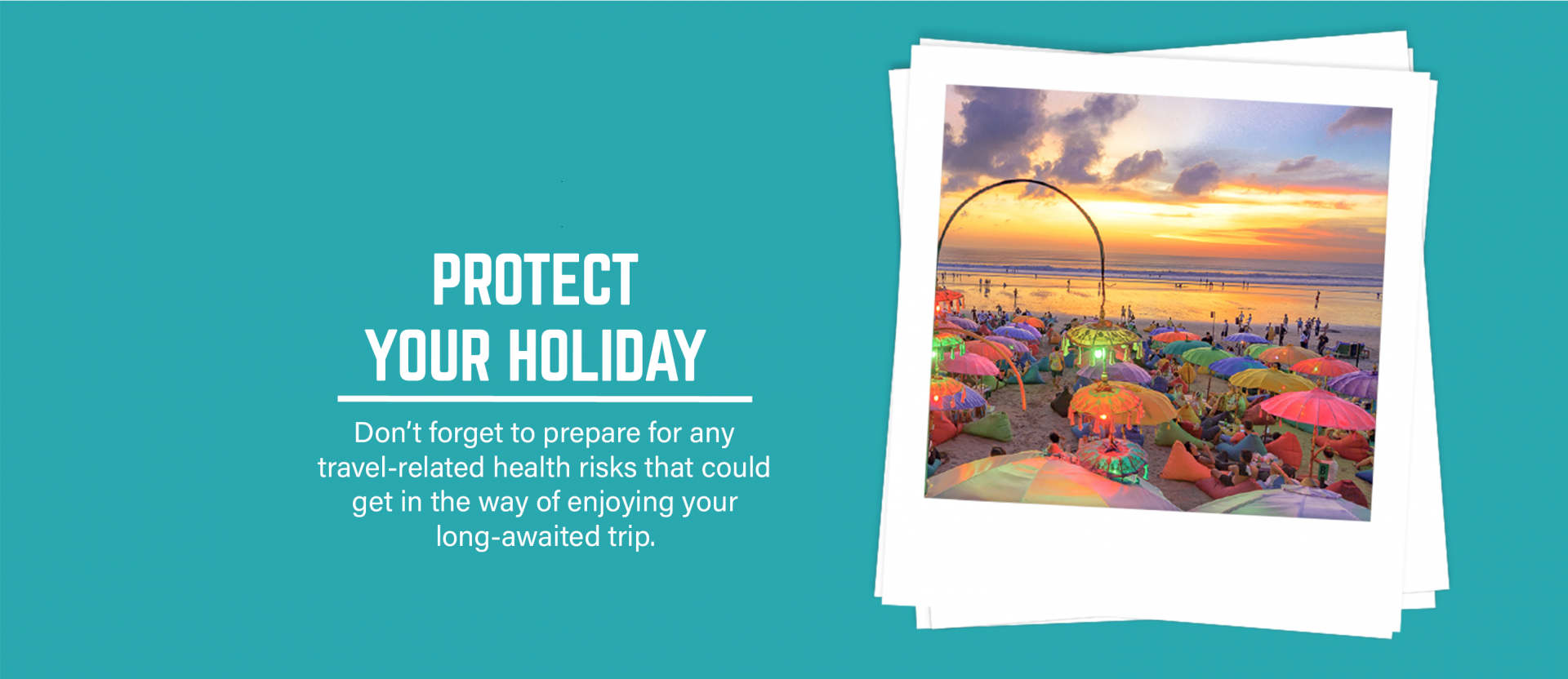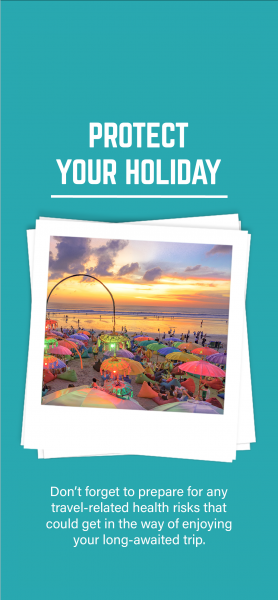
Australians are avid travellers - over 5 million of us go overseas on holiday each year. Some of our most popular travel destinations are countries where the risk of contracting serious infectious diseases such as typhoid fever, hepatitis A and B, polio, yellow fever, rabies and malaria are common, and can pose threats to unwary travellers.1

Australians are avid travellers - over 5 million of us go overseas on holiday each year. Some of our most popular travel destinations are countries where the risk of contracting serious infectious diseases such as typhoid fever, hepatitis A and B, polio, yellow fever, rabies and malaria are common, and can pose threats to unwary travellers.1
Catching an infectious disease can impact you as well as the people you travel with. Some of the infectious diseases you might face overseas can be prevented by vaccines, alongside other health measures described on this page. Your childhood and routine immunisations should be up-to-date and you may need new ones. Many vaccines provide years if not life-long protection, so you may not need to update them before every trip. Regardless, it’s a good idea to see your doctor before travelling, as every trip is different and the risks vary.

Catching an infectious disease can impact you as well as the people you travel with. Some of the infectious diseases you might face overseas can be prevented by vaccines, alongside other health measures described on this page. Your childhood and routine immunisations should be up-to-date and you may need new ones. Many vaccines provide years if not life-long protection, so you may not need to update them before every trip. Regardless, it’s a good idea to see your doctor before travelling, as every trip is different and the risks vary.
Your GP can provide you with travel health information specific to your destination, including the required vaccinations, medications and precautions to maximise your protection. Some vaccinations only require one dose while others require several doses over weeks or months before you travel. It’s best to see your doctor at least six weeks before departure, but it is never too late. Remind the people you’re travelling with to see their GP too.1
Get travel health advice from your doctor

Your GP can provide you with travel health information specific to your destination, including the required vaccinations, medications and precautions to maximise your protection. Some vaccinations only require one dose while others require several doses over weeks or months before you travel. It’s best to see your doctor at least six weeks before departure, but it is never too late. Remind the people you’re travelling with to see their GP too.1
Get travel health advice from your doctor
Getting sick overseas is not always something that we take into consideration as we plan our overseas holiday. Fortunately, there are a few simple precautions you can take to stay healthy.
Consuming contaminated food and beverages is one of the most common ways for travellers to develop illnesses such as travellers diarrhoea, hepatitis A, typhoid, polio or cholera. You don’t have to eat from street stalls or drink from rivers to be at risk from infectious diseases. Even travellers to 5-star hotels should consider protection against food and water-borne diseases. Ensure your water is properly purified and food is well cooked, boiled or peeled. Brush your teeth with purified water and avoid drinks with ice as you can’t be sure of the source.1
In some countries, mosquitoes can spread malaria, dengue fever, Japanese encephalitis, yellow fever or Zika virus disease. Avoid being bitten by wearing protective clothing (long sleeves and pants), always using an effective insect repellent, and sleeping in a screened room or under a mosquito net. Stay away from animals and avoid being bitten, licked or scratched, as it can lead to a number of infections, including rabies.1
Soil contaminated with bacteria can enter broken skin and cause diseases, such as tetanus. Parasites capable of entering unbroken skin can be found in soil or sand contaminated by things such as cat or dog faeces. Always wear protective footwear and try to avoid direct contact with sand and soil that may be contaminated.2
Coughing and sneezing
Along with the common cold, diseases such as influenza, diphtheria, meningococcal meningitis and tuberculosis are transmitted from person-to-person through coughing or sneezing. Try to avoid exposure to infected individuals. Always wash your hands before eating or preparing food.1
Sexual activities and blood
Diseases such as hepatitis B and HIV can be transmitted via contaminated needles, syringes, blood and sexual activities. Travellers should try and avoid casual sexual encounters and practise safe sex. If you require condoms, needles or syringes, carry your own. Think twice about getting tattoos and piercings while overseas.1
Getting sick overseas is not always something that we take into consideration as we plan our overseas holiday. Fortunately, there are a few simple precautions you can take to stay healthy.
Consuming contaminated food and beverages is one of the most common ways for travellers to develop illnesses such as travellers diarrhoea, hepatitis A, typhoid, polio or cholera. You don’t have to eat from street stalls or drink from rivers to be at risk from infectious diseases. Even travellers to 5-star hotels should consider protection against food and water-borne diseases. Ensure your water is properly purified and food is well cooked, boiled or peeled. Brush your teeth with purified water and avoid drinks with ice as you can’t be sure of the source.1
In some countries, mosquitoes can spread malaria, dengue fever, Japanese encephalitis, yellow fever or Zika virus disease. Avoid being bitten by wearing protective clothing (long sleeves and pants), always using an effective insect repellent, and sleeping in a screened room or under a mosquito net. Stay away from animals and avoid being bitten, licked or scratched, as it can lead to a number of infections, including rabies.1
Soil contaminated with bacteria can enter broken skin and cause diseases, such as tetanus. Parasites capable of entering unbroken skin can be found in soil or sand contaminated by things such as cat or dog faeces. Always wear protective footwear and try to avoid direct contact with sand and soil that may be contaminated.2
Coughing and sneezing
Along with the common cold, diseases such as influenza, diphtheria, meningococcal meningitis and tuberculosis are transmitted from person-to-person through coughing or sneezing. Try to avoid exposure to infected individuals. Always wash your hands before eating or preparing food.1
Sexual activities and blood
Diseases such as hepatitis B and HIV can be transmitted via contaminated needles, syringes, blood and sexual activities. Travellers should try and avoid casual sexual encounters and practise safe sex. If you require condoms, needles or syringes, carry your own. Think twice about getting tattoos and piercings while overseas.1
Where are you flying? Every traveller and each trip is unique. Your risk of exposure to disease and developing an illness while travelling is influenced by many factors, including: destinations, itinerary, length of stay, food and water sources, type of accommodation and more.3
Where are you flying? Every traveller and each trip is unique. Your risk of exposure to disease and developing an illness while travelling is influenced by many factors, including: destinations, itinerary, length of stay, food and water sources, type of accommodation and more.3
-
Smartraveller.gov.au. Infectious diseases. Available at: https://www.smartraveller.gov.au/before-you-go/health/diseases (accessed 28 March 2022).
-
New South Wales Government Health. Tetanus Fact Sheet. Available at: https://www.health.nsw.gov.au/infectious/pages/tetanus.aspx (accessed 29 March 2022).
-
Centers for Disease Control and Prevention. CDC Yellow Book. Introduction to Travel Health & the CDC Yellow Book. Available at: https://wwwnc.cdc.gov/travel/yellowbook/2020/introduction/introduction-to-travel-health-and-the-cdc-yellow-book (accessed 29 March 2022).




